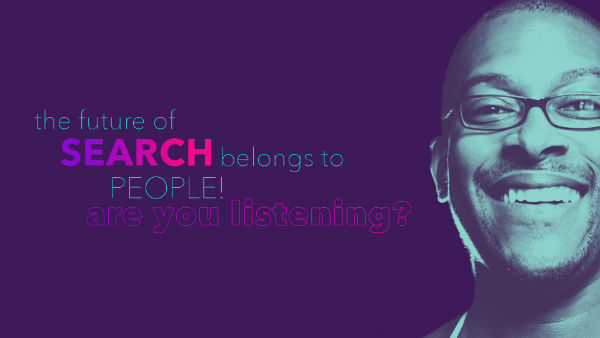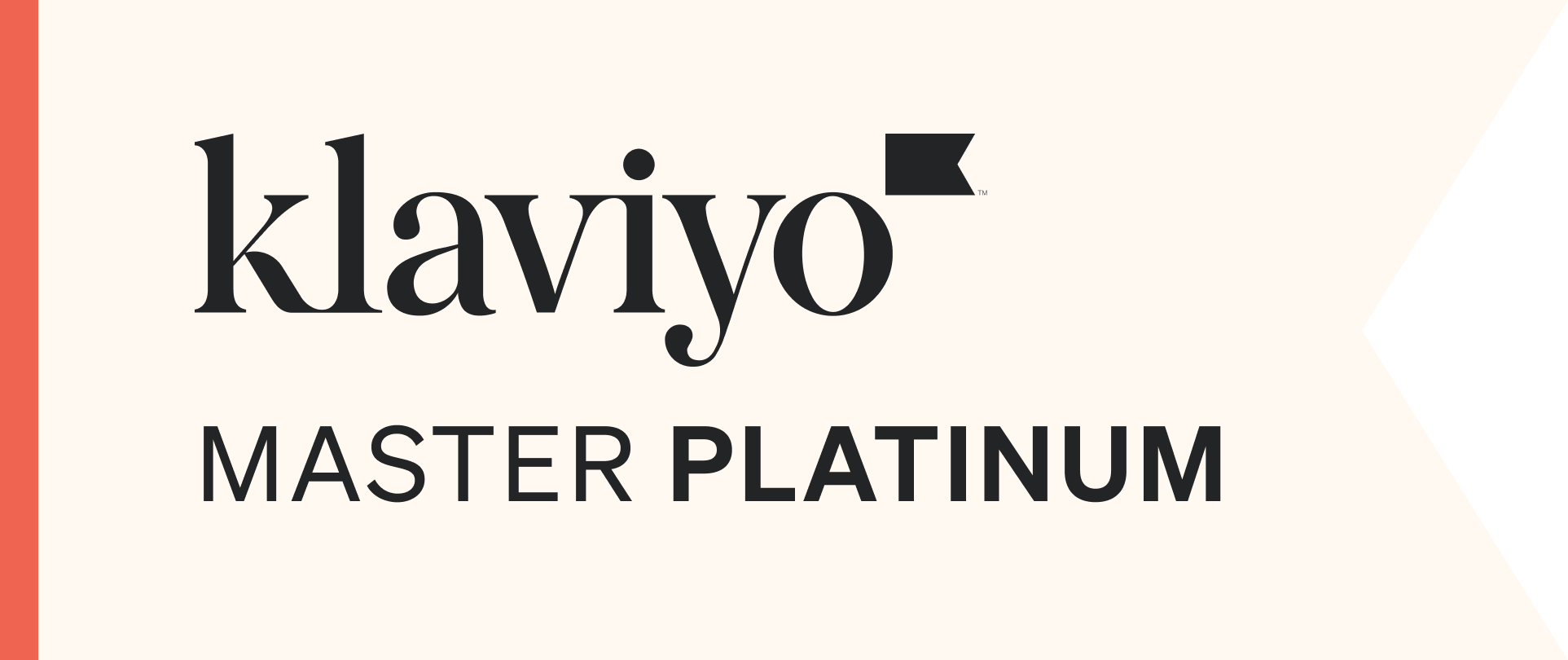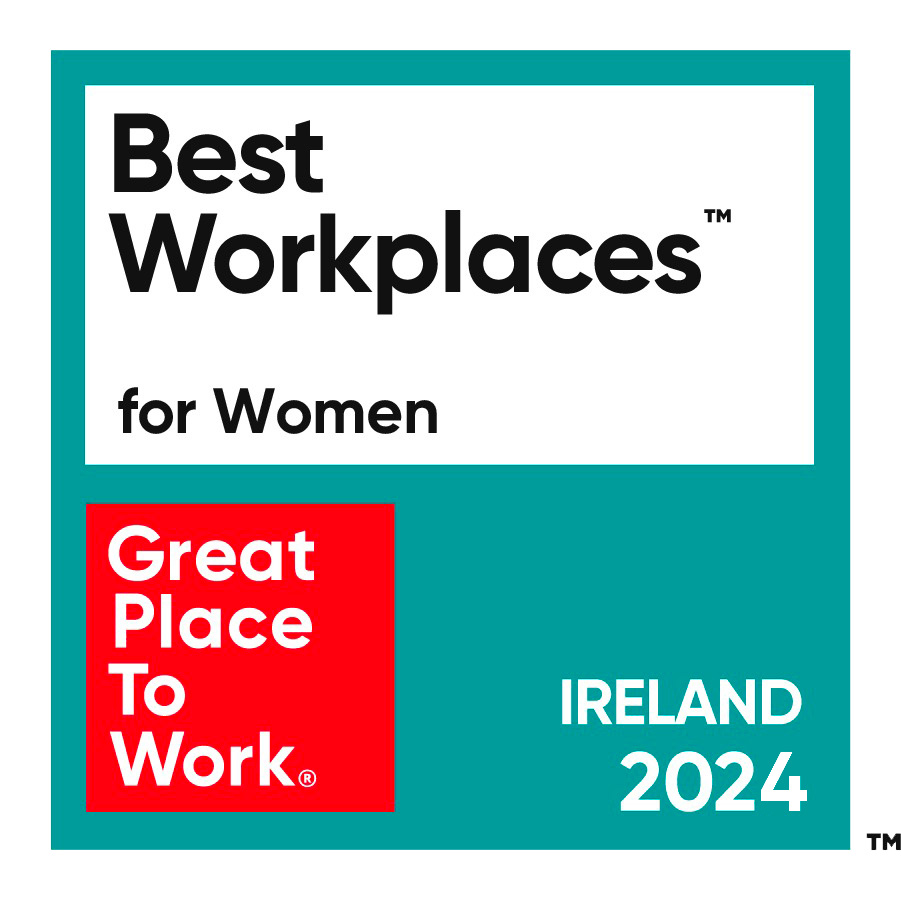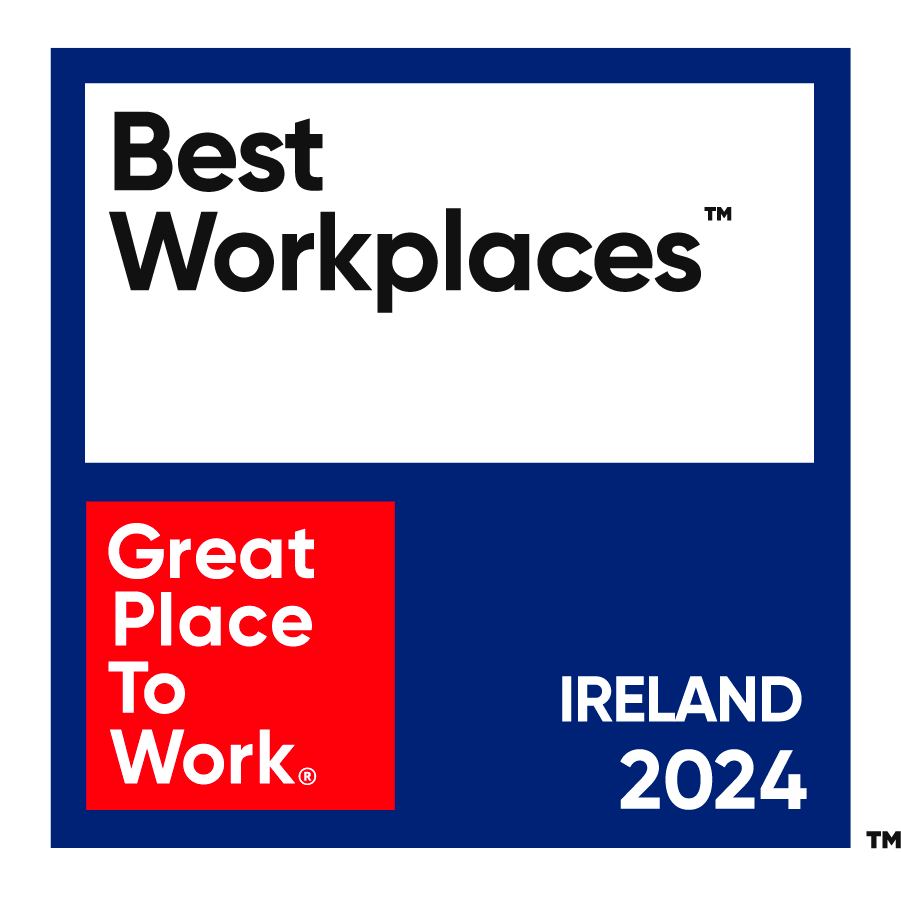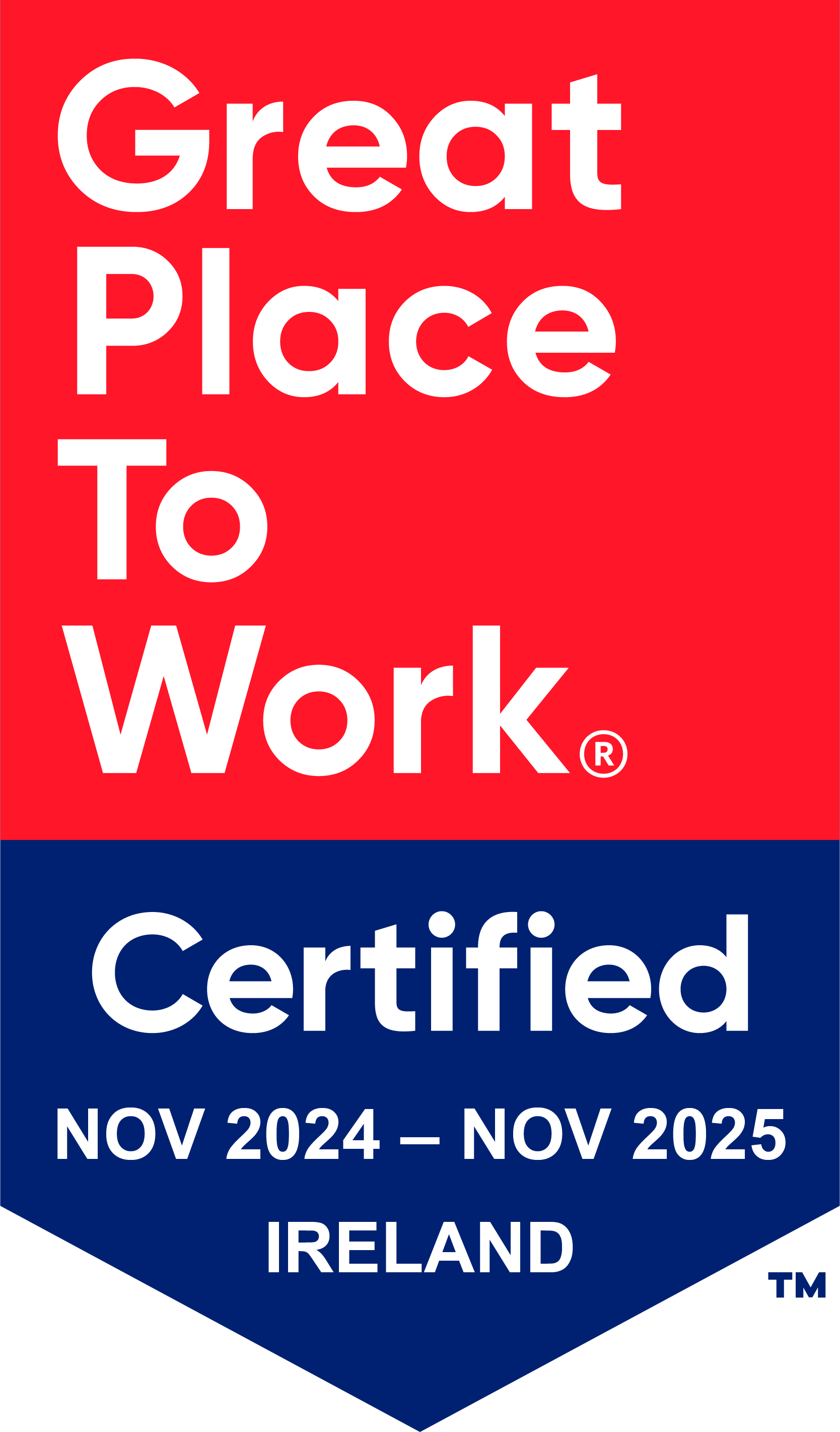By Martin on 15 Sep 2017
The Future of Search Belongs to People - Are You Listening?: Intro from Alan Coleman
One of the things I love about the digital marketing industry is the transparency. It's really open. People are happy to share. People understand that you're not giving away insider secrets. We all get smarter from each other. So when we get up on stage and we share, "Here's what we're doing and here's what we're thinking," we're not doing anything new. We're really just following in the footsteps of people like our next speaker.
Myself and Brendan had the pleasure of going to MozCon two years again and we were blown away. There was one guy who just totally stole the show, and it's Wil Reynolds, our next speaker. Wolfgangers have been to seen him twice since, we've travelled to London and we've seen him here in Dublin, and in both occasions, people were going to the event because they wanted to see Wil Reynolds.
Wil Reynold's is one of the best and I don't mean just speakers. His agency has over 100 people and is one of the most respected agencies in the States. And he's a fantastic guy. He shares his SEO insights. He shares his business thoughts, and he really puts a lot of himself and his personality into everything he does as well. So I'm so happy that Wil chose to come to Dublin to share himself with us today. Please give him a really big Irish welcome.
The Future of Search Belongs to People - Are You Listening? - Video
The Future of Search Belongs to People - Are You Listening?: Transcript
All right, well, thanks for having me. This is completely awesome. I've cut out about half of my slides in the last half hour, so if this is a little rocky, I apologize. I also just flew in about five hours ago. And I'll be back on a plane tomorrow to go see my son. All right, so.
Focusing on People
This is what I believe. I have an agency. We're probably about 130 people now, so I'm constantly looking at where are searchers going, and thinking what do I have to do to make sure my agency doesn't become the next agency that's like, "Oh my God, it's Panda, we're all getting fired. "No, let's just become content marketers now." You know. So I'm focusing on people like crazy. And the reason why is because I'm a consumer of the same thing that I do. I search and try to find solutions all the time. And how often am I extremely disappointed by what I find? Think about it. How many searches do you do where you're like, "This is complete shit." I wish I had all these people as clients. So there are millions of unsatisfied searchers.
Let me give you an example. You search for the word "SEO company". Now if you search for that word, all of us in this room would know that is not a national or international search, it's actually a local search. Because Google's machines have learned that people typically would put a word like Dublin or Philadelphia or San Diego at the end of that word to find their solution. So Google does what Google does well. Why make you have to put in extra words if we can just show you what you probably want anyway? So knowing that, right, Google's top suggestions are always local. People are searching for this near me. It's right in front of every SEO person on the planet. So why is it that when I did that search, I found two companies that were thousands of miles away from me? Paying 30 dollars a click. Paying for it. We're gonna talk about that a little bit later.
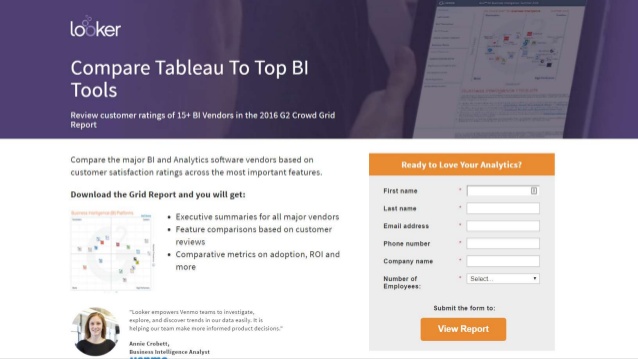
I was looking at this tool, looking at this tool Looker. One of the most searched for phrases associated with their name is "pricing". Awesome. So they ranked number one for it. I click on the result. Tell me where you see pricing. Do you see it? I don't. Thanks, Looker. So then I went to the next paid result. For InsightSquared. And I said, great. Meets requirements, graphs and charts? Really? That's one of your features is like, "Oh, we're gonna do a comparison for you, we're gonna tell you, 'Oh, they have graphs and charts.'" Thanks. Where's pricing? You're paying for this click, InsightSquared. Where's the pricing? That's what I said I freaking wanted. Where is it? Nope.
Then I looked at my third ad, which is SiSense, and they gave me all the right signals. "How much BI really costs." Yes, cost. Pricing. Yes. And even their URL. Pricing, yes. Pricing. "Pricing for dummies." Yes, pricing. "SiSense pricing plans." "How much does BI cost?" Yes, pricing. Clicked on their ad. Thought I found my oasis. I'm like, "Yes, this is gonna be the right answer." Here it is. Where's the fucking pricing? You just paid for me to click. You are paying to mislead me. There are real costs. I bet you Google probably couldn't afford this building if people didn't stop buying so many bad clicks.
You look at this and you're like, "My God, what? Oh, Jesus. I just wanted the pricing. I just wanted the pricing." So then I started trying to compare it to Tableau. In the process of looking for pricing, oh, Google's gonna give an answer all right. If you don't wanna give it, Google's not gonna go, "Well, Looker doesn't wanna give their pricing, so we're just gonna show zero results." No. Google showed a result from PCMag. For the word "Looker pricing". So now because you don't want to help users because you don't want your pricing out there, you're allowing somebody else to mislead your user. Rich snippets. Tableau. Their pricing is actually wrong. But because they didn't wanna actually tell people what the pricing was, for years, which is what we wanted, right? I showed you Looker. The second most searched for phrase with their brand name is the word "pricing". And they do not wanna give it to you. And they are going to pay to drive clicks to something that doesn't solve my problem.
Showing People What They Really Want
I look at pages like this around knee surgery. This was one of our clients. And the minute I saw this page, it made me horrified, and I called the client up and said, "Here's the money. Don't even worry about paying for it. I just don't want my team to have to drive clicks to a page that looks like this." Why? Because when you wanna get knee surgery, you know what we're competing against? This page. That's why you get knee surgery. Nobody woke up this morning and went, "You know what I really want? I want somebody to cut my knee open and give me anterior ligament cruciate whatever surgery." No, you're like, "I wanna get back to travel. Or I'm gonna get back to my life, or gardening or running." That's your why. But sometimes we get so focused on the words we have to use and whatnot that we forget that there's freaking people behind every one of these searches, and they're lost. And they're looking for an answer.
Anybody here work at Looker? Tableau? I'm coming up. I'll come up and I will just start punching you. Because you know what? Think about what happens if you work for one of those companies. You are putting out there what you fucking hate. You hate when you search for the word "pricing" and you can't find it because some company doesn't wanna give it to you. Do you? How often do you search for the word "pricing" with a software and they don't give it to you, and you're like, "I'm so glad I gotta sign up for your newsletter now. I wanted pricing, but now yeah, sure, give me a white paper." No. I wanted pricing. Just give it to me.
Talking to People
So the problem with search today is that so many of us have just minimized people to the words they search for. As if there's nothing else at play there. See, if you look at information like this and read this, and this a study done on Chinese-American buyers. What tool are you using today that would help you know this? What tool do you have in your arsenal today? SEMrush? Eh. AdWords? Eh. What tool is gonna tell you that if a house is on a dead-end street and you believe in feng shui, that that's gonna deter a third of your audience from ever buying that house? Where do you get this information in your marketing?
I have this little secret for you. It's called talking to people. Talk to your customer. You can't sit behind your desk all day, and run searches and pull CSVs and do awesome pivot tables without actually talking to your customer. That's the truth. I just found this out two days ago, so I haven't had a chance to put the slides in. Thank God, because I would have to cut them out anyway.
Answering People's Questions
One of our clients is a decking company. They build composite, non-wood deck. And I said, "Let's go talk to some of their customers." And they let us do it. Actually, no. They didn't let us do it. So I put something up on Facebook that's like, "Has anybody gotten a deck recently?" A bunch of people responded and we interviewed those people. Don't accept no from your clients, ever. I don't allow it. I go, "Well, I can survey people on Facebook all day. You can't tell me what I can write on Facebook, can you? Well then I'm just gonna use my audience to find out something about your customer. I'm fighting to learn who your customer is." Guess what we found out was one of the number one things that cause people to want composite decking over real decking? Splinters.
I would have never come up with that on my own. No keyword research tool would have ever taught me that. Anybody here enjoy getting splinters on a wood deck? Anybody here have a kid walking around on a wood deck right now and you're like, "I hope he doesn't, or she doesn't get a splinter." That was the catalyst for the first four out of seven interviews we did. They all mentioned splinters. Talking to people. So now can I take that knowledge and go to my client and say, "Okay. How can I talk to people about that and talk to them in the way that they're actually most concerned about?" Versus me being like, "Do you want a composite deck?" Because you know what, the keywords you're targeting today were triggered by some other thing before the person typed it into Google. And it's your job to understand what was the catalyst that made that person type this thing into Google?
So you type in "composite decking". You know what made you type that into Google? Your little kid got a freaking splinter in his foot. So I gotta understand that problem better because that makes me a better marketer. I don't care how good your landing pages are. If you don't understand your customer, I'm gonna beat you.
And the problem is, there's no intonation in keyword research. Right? You don't actually feel the struggle. So we interviewed customers and talked to them and watched them go through the search results, and I'll show you some of that in a little bit. And you can hear the frustration. You know what's really good, is when you have a site and you watch people go through the web and a pop-up comes up. They always have a freaking bad thing to say about it. But what do we do as marketers? Gotta get my numbers up. Pop-ups. Everywhere.
So let's do a little bit of a history lesson. 1999. My Name Is came out. And this was the kind of SEO most of us were doing. Well, I was doing back then. "We're just gonna use the word flowers a lot. Yeah. Ranking. Altered Vista, bitches." So we did this. And then in 2005 we said, "Oh, well Google's out now." Because back in 1999 when I started doing search, Google mostly just powered Yahoo. You didn't go to Google as a destination to search, you went to Yahoo and Google powered Yahoo. By this time, it was like, "Oh. We have to get links from sites like EzineArticles. And Buzzle and selfgrowth.com because it's got page rank," right? And then around 2012 ... Yeah, that was already five years ago, folks, when you were like. Or is it? Whatever.
You know, all these bad SEOs, because they all still like SEO, were like, "I'm now a content marketer." No, you're a keyword stuffing page rank finder. You're not a content marketer. You just pivoted yourself because otherwise, you wouldn't have a job, but when you wake up in the morning, you'd much rather spam than help somebody solve a problem with content. And even in this phase, right, "Oh, SEO and links, and measuring, and promote, and publish." We're still ignoring something. Even in today's time. We are still ignoring something. We are not listening to our customers. So I am building a plan for my company for 2020. And how we're gonna get there as fast as humanly possible, because I'm sharing this with all of you, so I don't want you to beat me to my own vision. Which is why I'm not gonna tell you all of it. Sorry.
Nah, that's not my style at all. I'm gonna tell you all of it. I want you to listen to this.
Listening to Real Users
All right. We are asking users to solve problems on search engines, and we're videoing them and asking them why they're clicking on what they're clicking on. Why they're not clicking on other things. We're watching them get to sites of our competitors and saying, when they go, "Oh, this is really good." "Well, what do you like about it?" "Oh, well it does this. And it does this. And it does that." And we go, "Haha." Because in my belief, the future of the algorithm is gonna be much more based on user signals. We're seeing it already. If you search for "Will Reynolds" right now, on Google, you'll find all the results are about me. But the image results are disambiguated. Why? Because there's a model out there named Will Reynolds, and I ain't that model.
So why did Google start knocking me out of image results but not the rest of the results? Because when you are looking for a model's content, it's their face. I could put a bag over my head right now and you could still get all my content. Right? Google's machines are learning that human signals told them, Will Reynolds, that you see in front of you is not the right answer for a good amount of people who were looking for a model. And when people look for models, they want images. And when people search for Will Reynolds, we can probably get rid of half of those images and show the model because they'll be more satisfied as searchers. Because they'll see that really hot dude and be like, "That's the Will Reynolds I wanted."
So my best is on the fact that users and their satisfaction will be baked more and more into the algorithm. That's why when you type in "SEO company" it shows all local results. Because Google saw people modifying their search for years. They have all this data on that word, and they go, "Well, most of the people that did that were more satisfied when they found local people, so let's just give it to you." Those are two examples of that being right in front of your face.
One of the things about this user that I thought was interesting is he uses the word simple. And you know what this made us do as a company? We went, "Right, nobody likes a complicated app." But most people don't type "simple" in front of their search phrase. But it triggered us and reminded us of that. So then we started thinking, "Okay, what are some of the other attributes around these words?" And I'm gonna show you how we're getting that out at scale in a second. But I wanna show you another one.
Notice how all the things he's skipping over to click on this one.
"Plus I have an iPhone."
All right. I don't have the time to go through this and show you that thing multiple times, but we did this video in January. Second week of January. He already believed that anything in 2016 was old. 2016 was just two and a half weeks ago, bro. The other thing is the title said "iPhone" in it. If you do a search for photo editing apps, you'll see some of them say, "33 best photo editing apps." But no one in here has a hybrid iPhone-Android device, do you? So why would you wanna show me stuff about the iPhone if I have an Android?
And for him, he skipped over all those results because he's like, "Oh, iPhone. I have an iPhone. That's for me." These titles and descriptions have to connect better with customers. I'm gonna show you impact as a result of doing it. We interviewed another woman on a mobile. She said, "I want something that's recent." She said that and we watched her skip over this one from October 22nd, this one from January 2nd. She skipped over this one. This one from December 19th. To click ... She skipped over this one from December 2016 and clicked on this one from October 25th. She clicked on the oldest result, but said, "I want one that's recent." Why? Look at where the dates are. A lot of average users don't look over here. You know where she looked? In the blue where she clicks. So no date, no date, no date, no date, no date? She clicked on the number one result. Skipped all of these and clicked on this result.
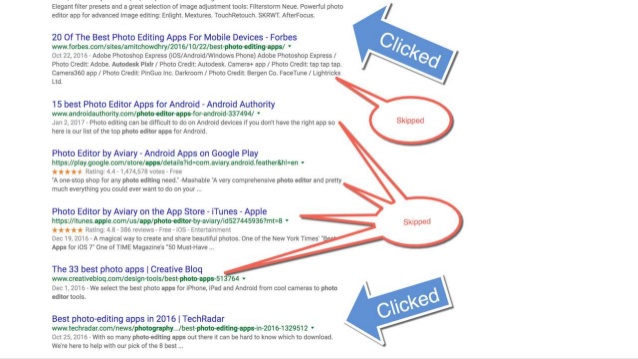
If you are using a click-through rate curve in anything you're recommending for a client right now, you have never talked to a user. I guaran-fucking-tee it. Because if you've ever looked at a user go through the search results, I have never seen somebody go, "One, two, three, four." Never. They read. They scan. They skip. You do the same freaking thing, but yet you go to your client like, "Well, if we're at number two, we're gonna get 12% of the clicks." Remember how you act on the web yourself.
And this is the problem is like, we forgot to talk to the people who buy our shit. We don't talk to them. And we have to think of basic human behaviour, right? We hate people trying to sell us stuff. But our friends at Google will take your dumb money all day long in paid. Let me show you an example of this.
People at the Core
So we're battling for this word "cloud computing" for a client of ours who I cannot mention because they're so big they will take everything I own. So we're battling for the word "cloud computing". Two agencies come in with all their content and link shit and get fired, and they bring us in. We're like, "Great." Well, we stop and said, "Well, the definition's in the first spot. What do you think that means?" People wanna be educated. Look at your page. It's about selling people shit. So you're one of the biggest companies on the planet. You don't need more links. You don't need more content. You need to solve users problems because Google was smart enough to suppress them. Because the user signals weren't strong enough and the average SEO came in with the average SEO toolbox. Links and content. Links and content. We didn't even interview customers. We just looked and said, "Definition. That probably means something."
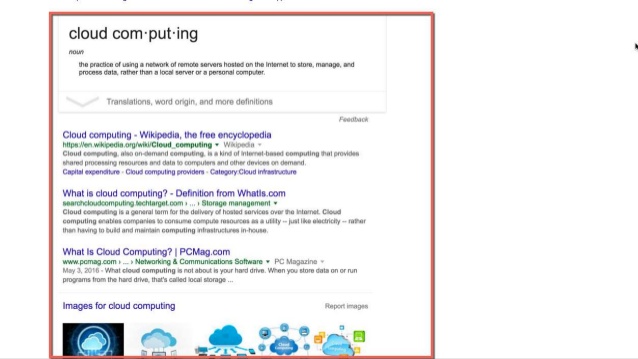
And then we did simple shit like we didn't hit enter on Google, and we're like, "Look. People want definitions, PowerPoints, PDFs, they wanna know what it means. Basics. For dummies." Does your content sound like it solves that person's problem? No, because it's like, "Here's our pricing and here are these really complicated things." Let's check the alignment on this, though. This is a paid search ad for IBM. For the word "cloud computing". Look at it. Does it educate you? Does it give you the basics for dummies? PowerPoints, PDFs? All I had to do was not hit enter to find out what people were looking for. Does it look like it gives you any of that at 35 to 40 dollars a click? 50,000 searches a month. Lot of money spent. It's getting us this room, right?
Microsoft. Paid landing page. Look at it really closely, because the presentation you were doing before about the machine learning and the stuff you're working on? I gotta get you connected to one of our guys because you guys are doing some cool shit. I'm trying to walk in your footsteps. But we're doing things like comparing paid search landing pages to the organic landing pages at scale with machines to see how different they are. Because what I'm about to show you is why they're wasting money because they're not solving the user's problems. So here, Microsoft Azure, right? If you don't know what cloud computing is, what are the odds that you wanna try SQL server 2016 SP1? 30, 40, 50 dollars a click. 50,000 searches a month. They're still there. I bet you if you search for it you'll see them.
This site paid for the word "cloud computing" and wouldn't even tell me what they did. Get in the funnel, right? Funnel, funnel, funnel, funnel, funnel, funnel. We were like, "Oh, well, I wanted a definition, man. If any of your smart people just didn't hit enter on Google, you would see the number one word that people wanna know when they search for cloud computing is 'definition'." "No. You wanna get in my funnel." Look. Images. Why does Google's machine learning think that images ... not always, this is fluctuating. But at the time I took this screen grab, images are the right answer for "cloud computing". Because when you're trying to explain to your grandma or your mom how cloud computing works, you're like, "I have a computer at home. And when I type stuff on it and click save, and then I go to work, it's there too." And you have to draw a little line for grandma so she understands how the cloud works.
Google realise that that's what people also wanted. They wanted thing to describe it. Now look at the IBM page all of a suddenly for their organic ranking. Does it look anything like that other IBM page I just showed you? Nope. Notice how they talk. "What is cloud computing?" Right, that's what people freaking wanted. Oh, all of a suddenly Microsoft, to rank organically, has a beginner's guide. But on paid, they don't. They wanna sell you SQL server 2016 SP1.
One of the things I am giving my team so much money to go do is to go out and actually talk to people. One of the most interesting things we found for one of our clients, again, decking client. We went to Home Depot, which is, in the United States, it's like a home improvement store. A big box home improvement store. And what we learned through observing behaviors at Home Depot ... people would go in a Home Depot thinking they wanted my clients product. They got to Home Depot and this lovely lady goes, "Oh, that's the expensive stuff. You want the cheaper one that's just as good. You're not gonna get splinters with this one either." So all the digital marketing in the world was not there for that customer at his zero moment of truth. So that client ... Because don't you love it, the Wolfgang team, don't you love it when clients let you do great work? Right?
Because this client allowed us to basically build a paid search campaign on the latitude and longitude of every Home Depot and Lowe's, specifically targeting the words and the brand that those associates were saying, so we could at least try to fight against that, those new queries. Because those people went in having typed in one thing. Got in front of the associate and started typing in new words when they were at Home Depot. "Oh, I didn't know that brand existed. I'm gonna type that in now and then I'm gonna type that in say, 'What's the warranty on it? What's this? What's that?'" And I wanna target you right then and there.
Talking to people. One of our clients said, "Oh, all of our customers are contractors." This is after they spent 300,000 dollars with some content marketing agency to build them content for contractors. We interviewed seven people. We begged to interview seven people. They said, "Okay." We said, "Well, we've learned all this stuff. Let's change all these pages." They said, "No." We went, "What the freak?" So we said, "Will you let us change one meta-description? Just one? Based on what we learned." They went, "Okay, we'll let you do that." That's how I try to get my team to let my clients let us do good work of them. If you come in and say, "Well, I wanna change all these pages you just spent 300,000 dollars on," they're like, "No thank you." But if you said, "Can I just change one? And then we'll get the data and we'll say."
We changed this description that'll go from this to this, which is not a technical, it's more for the generic people that we interviewed and learned from. And we saw a 57% increase in clickthrough rate and 59% in conversions from this one page by just changing the meta-description. And the title. To more connect with people. Simple.
People Want Guidance
People want guidance. They don't want another ultimate guide. People want guidance. Not guides. Let me show you an example. If you actually get into building guidance for building, how you can use it in paid [inaudible 00:23:13] SEO and paid stuff, which I'm super excited about. So if I'm gonna move into an office. Anybody here ever move your company into an office, one of the hardest things is how much space do I need? You buy too much, you're spending for years. You buy too little, you gotta move too early and then you gotta break your lease and it's expensive. When people build tools like these, ask yourself, where do you have a tool like this that really helps somebody figure out how to solve their problem? You get to do really interesting things.
Now, not with this specific example. But imagine if I had a little button here that was one, five or 10 plus. Each one of those that you click can create an event. Each one of those events lets you adjust your bids for PPC. So if you're a small company and you only put in that you have one executive office? I can make sure that I never show my ads to you because I don't wanna spend money on you when you type in office supplies. Or office related keywords. But if I got a 20 here and you click on it and you're a whale, I can actually adjust my bids up. I can remarket and target you differently. So many content marketers are out there building great content that solves people's problems, but because they're not trying to understand how paid works too, they don't even know how to do this. I'm gonna skip some of this. No, I'm at a decent time.
So one of the things I like to do tactically is I like to use a tool called [Stat 00:24:26] You can use Authority Labs or any tool that just scrapes Google. You may have your own. And I like to take out the suggested results at the bottom. And then run simple things like word clouds on them and understand, if I look at 10,000 different suggested results at the bottom, or 8,000, let's just say. What are the big words that people are shifting to? We did this for a client who has an app that does photo editing. Notice some of the things that we learned about people by doing this. We did that this way and we also put in another dataset by looking at the search query report. Because on pay-per-click, right, on PPC, you get matched for all kinds of words.
Therefore we found all the long tale of words that were also converting. So we only wanted words that were converting. You see the word "best", which we'll talk about in a second. "Blemish". "Teeth". What's another cool one? "Airbrushing". "Wrinkle". "Easy". Easy there again. That's what people wanted, to know it was easy. "Eye". "White". Guess what? People were getting photo editors to make themselves look better on Tinder. That was their why. I found that in their search query reports, because some of those crazy long tales show you things that you otherwise wouldn't have thought of. So instead of me talking about the features of the photo editor, I'm like, "Look better in your Tinder profile." We're testing it right now, I'll tell you how it works.
Another thing to think of here is look at the results and start classifying them. So another thing that we're trying to do at scale is classifying results to see if they are recommendation results or if people want companies. And here's why. So I typed in "photo editing app". Looked at the results. Aggregator, aggregator, aggregator, comparing them. How many times did you search for something generic like "photo editing app" and just click on one of the results and install it on your phone? Never. You want people, you want reviews. See all the different sites that are reviewing stuff? Right? You get to the bottom, you start scraping these out at scale. You start being like, "Oh, people wanna know what the best is."
Keyword Modifiers
Now the thing you have to think of is, Google is showing mostly review sites for the query "best". What does that mean for you? You're not ... Okay. If I typed in, "best interactive agency in Dublin". And Wolfgang showed up as the number one. Would you just trust them? Do you just trust most companies, that when you put in "best" in front of your query, that if it's a company that ranks, that they must be the best? No. You're like, "I don't trust you to tell me that you're not the best. Of course you're gonna say you're the best." That's why we like review sites.
So you should be looking for your modifiers of keywords, and if you see modifiers that go, "We're not the right answer for that modifier." Then you've gotta be thinking, "Oh, how many of those sites show up in the GDN? So I can get my brand in front of them while they're looking for the best whatever. Because at that point, I'm not the right answer." Because Google's already telling you, "We're showing 90% of the results are all review sites." You are a company trying to get people in your funnel.
And there's a lot more you could do. Once you find the sites that are ranking for this, you can do banners. You can swap pixels, if you wanna be really cool with them and partner. Swap retargeting pixels, right? Oh, you're searching for "best"? You're eventually gonna search for a company. That's cool to do. There's a lot of things you can do once you make this realization. I'm also a big fan of scraping out "people also asks" at scale. So I just take them out of ... again, I use Stat. It's my favourite tool because a guy that doesn't know how to code can get this at scale. And then I start looking at what domains are most likely showing up as the one answer. Most often.
And of course, a lot of times you'll see Wikipedia and whatnot. But when you don't, this will also tell you, "These are the sites that people are going to visit before they buy your stuff." Because they're looking for the best. They're looking for reviews. They're getting all those reviews on all these sites, and then they may end up on yours. So are you getting links from these sites that have all this visibility? Or are you getting it from some mom blogger somewhere that doesn't rank for any of the words that people are ever really gonna search for? Because it's good for your page rank.
So the thing to start looking at is, okay, when people are saying, "How do I edit a picture?" I could write that content, in theory. But it's very telling to know that, well, TechRadar shows up. I'm gonna go back one. For tons of "people also asks" to the tune of ... 16 million searches. Just around photo editing alone. That's it. I gotta partner with them. You look at simple things like we do, like oh, if I type in 'combined power plant' for one of our clients, GE. And you're like, "Great. We got the featured snippet." And, "Yeah, we have the number one." Job's done, right? Wrong. People also ask.
Google's telling you, the machine learning is telling you, well, once people search for "combined cycle power plant", which you're number one for, and you have the rich snippet for, woo hoo, they also ask these questions. You have to bring these questions to your client and go, "Which ones of those are we the right answer for?" Because the problem is is when you see a "people also ask", you click on them. You go, "Oh, I did wanna know that next." Google's like, "Yeah. The machine learning has taught us that. Dummy." But then when I clicked on "bottoming cycle", which I had never heard of before, energycenter.org had that one. So I don't wanna just own this one. I wanna own every one of these, too.
And when I tell my client why they should write that content if it makes sense for their business, the reason goes something like this. Google has seen a search done hundreds of thousands of times. With all kind of factors on how many words people search for before or after, whether they were on mobile, desktop, and they have determined with machines that these are the questions people are highly likely to ask when they search for this. Why would we not wanna help those users get the right answer and be the answer for them?
So we're testing this right now. I did a search for like, "SEMrush guide" or something. "People also ask" showing at the bottom. I tend to believe that when you see "people also ask", or certain rich snippets like definitions or images showing up lower in the results, Google's less certain that that's the right answer. So it stays down. Watch one [inaudible 00:30:20] over time and you'll it start to move up if Google thinks that's a good answer, and it'll stay at the bottom or go away if they don't think it's a good answer.
So I started looking at these results here, and I saw "SEMrush versus Moz" was something that a lot of people who search for "SEMrush" were looking for. So we're testing this right now. So we ranked number one for like, "SEMrush guide", I think. And this result, actually as you scroll down, pops up something that's like, "Are you looking to compare SEMrush to Moz?" And we're linking out to another site. I just wanna see if people go, "That is what I was looking for." And click on it. Because if I do that, think about how it's gonna look to Google and to their algorithm. "Oh, that's a satisfied searcher. They didn't come back for ages." Because I'm continuing to push them onto other sites and keep them from going back to Google, which is always a bad signal that maybe you didn't find what you wanted. Not always. But sometimes.
I'm running that right now. So if you go to our SEMrush guide, you can be a part of my test. Last thing I'm gonna leave you with is ... Oh, that came out kind of pixelated. Look for the difference between mobile and desktop conversion rates. Something that our SEO is doing a ton of is they're just doing CRO on mobile forms and getting huge lift in conversions. So we're seeing clients are going, "Give me more traffic," and we're looking at this, and we're being like, "No. The answer's not get me more traffic, the answer is help me to convert the traffic I already got." As Google's machines get smarter about you not answering the right questions, you're gonna lose traffic. So you better up your skills to start learning how to get more of that traffic to convert, because there's gonna be a time where you're not gonna be able to make the traffic go up into the right anymore.
For one of our clients, 63% increase in mobile conversions, and they end up having a 50% increase in ... Now their traffic's about 50-50. So now we're getting them more money as a result. I'm just gonna leave the last one up. Ah. The last one up. 24% by fixing a clients mobile form. We didn't get anymore traffic for them. We're looking at the discrepancy between their mobile conversion and their desktop conversion. Comparing it to the typical, which there's a study out there that I should have linked to, but I didn't. And we looked at that, and we said, "We're significantly over that. So, therefore, that's what we should fix, stop building links. Start fixing people's mobile experiences." And that is real conversion increase.
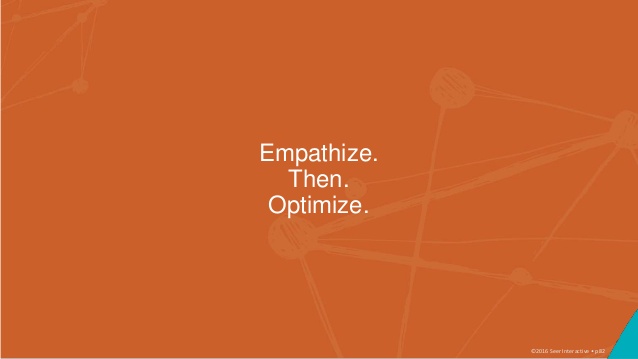
As search professionals, there's only one thing I want you to do. Emphasize before you optimize. Spend time trying to understand who these people are, and be committed to trying to solve their problem, and I think that's how we're all gonna win on search in the future. Thank you so much and I hope to see you there. Thank you.

